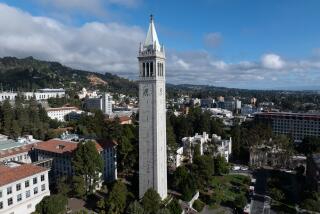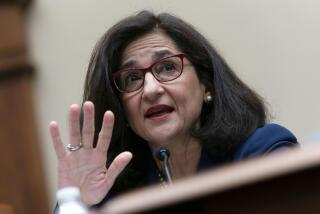Columbia educator named next UC Berkeley chief
A high-ranking Columbia University administrator and an expert on the history and culture of India will be the next chancellor of UC Berkeley, officials announced Thursday. Nicholas B. Dirks will succeed Robert J. Birgeneau in one of the most prominent positions in American higher education.
Dirks is Columbia’s executive vice president and dean of the faculty for Arts and Sciences at that New York campus, overseeing 29 academic departments. He will start as UC’s Berkeley leader June 1.
The 36,000-student UC campus often ranks as the best public university in the nation by various measures, and its student body is among the most politically active.
“Nicholas Dirks is a highly accomplished leader with the sensibilities and knowledge of a humanist, as well as extensive fundraising, academic and administrative expertise,” UC system President Mark G. Yudof said in an announcement. “I’m confident he will be a great fit for UC Berkeley.”
Dirks, 61, earned his bachelor’s degree at Wesleyan University and a doctorate in history from the University of Chicago. He taught at Caltech and the University of Michigan before moving to Columbia in 1997 and taking a professorship in both anthropology and history. Dirks, who speaks Tamil, has written books that often deal with the legacy of British colonial rule in India.
He impressed the screening committee of UC Berkeley faculty and students with his political savvy and understanding of the financial challenges of a state university, said Bahar Navab, a panel member who is president of the UC Berkeley graduate student government. Although most recently working at a private university, Dirks appears committed to public education, she said.
“We wanted someone who can be a change agent and lead us through the next phase for UC Berkeley,” Navab said. “He seems like the person who can do that.”
John Coatsworth, Columbia’s provost, said in an interview that Dirks’ experience in fundraising and in stretching resources to hire the best faculty across many departments at Columbia will serve him well at UC.
“He is so knowledgeable about so many fields, even in the sciences,” he said.
In addition, Coatsworth noted that Dirks has dealt with student protests, notably helping to peacefully end a 10-day hunger strike by Columbia students in 2007 over issues of alleged racism at the school.
Dirks did not return messages Thursday. UC officials said he and Yudof would not publicly comment on the appointment until the UC regents review it and vote on his salary and other employment terms at a special meeting in late November.
His proposed pay was not released pending negotiations. Birgeneau’s salary was $436,800 a year, and Dirks is expected to be paid at least that. In addition, talks are underway to bring Dirks’ wife, Columbia history professor Janaki Bakhle, also an expert on India, to a UC faculty position.
Dirks has family connections to UC: His late father, J. Edward Dirks, served as the vice chancellor and dean for humanities at UC Santa Cruz in the 1970s. Earlier in his career, the elder Dirks, then a Yale University professor, took his family on a Fulbright scholarship to India and the then 12-year-old Nicholas became enthralled with the country and studied Indian drumming. That began his lifelong fascination with India, leading to expertise in South Asian studies, he told the Daily Spectator, Columbia’s student newspaper, in 2008.
In the same interview, he recalled his own college days and said he “wasn’t a hippie per se — I didn’t do drugs, but I did have long hair and a red bandanna.” The Vietnam War reinforced his interest in international affairs and his belief that Americans needed to learn more about Asia and Africa. So while other students protested the war, he mainly read books in his dorm, he told the Spectator.
Birgeneau, a physicist who is 70, has led UC Berkeley since 2004 through state budget cuts, Nobel Prizes and campus protests, including large Occupy demonstrations last year that triggered complaints about rough treatment of protesters by campus police. A very successful fundraiser, he announced in March that he would step down Dec. 31 but now has agreed to stay on until June to accommodate Dirks’ schedule.
More to Read
Sign up for Essential California
The most important California stories and recommendations in your inbox every morning.
You may occasionally receive promotional content from the Los Angeles Times.











